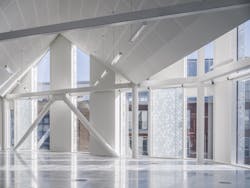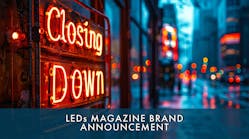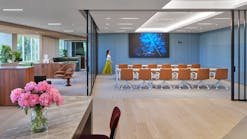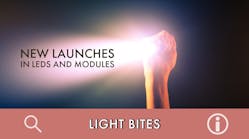Holding true to its recently proclaimed “post-recovery” mode, Fagerhult Group reported a quarterly rise in sales and profits, although ongoing supply chain difficulties and COVID-19 disruptions continued to curb the numbers. The company boosted profits in part by raising prices.
In announcing results for the first quarter ending March 31, Fagerhult noted that it is withdrawing from Russia, a consequence of that country’s invasion of Ukraine.
The Habo, Sweden-based lighting group also emphasized the importance of connected IoT lighting to its strategy. While “traction” is good in both indoor and outdoor settings, CEO Bodil Sonesson acknowledged that IoT lighting is still in an early stage, with the greatest barrier being general “ignorance” of the technology’s potential benefits. To that end, the person who the company eventually hires as its first-ever chief technology officer will be responsible primarily for market development and “thought leadership” of connected lighting, as opposed to actual technology development, Sonesson said.
CFO says sales rose more than 7%
For the quarter, sales of all products across Fagerhult’s 12 brands were 1.87 billion Swedish Krona (US$190 million), a 7.5% rise compared to the same quarter a year ago. Net profit jumped by over 24%, to 119.5 million SEK ($12.1 million).
About 2% of the 7.5% sales increase came from price hikes the company imposed to help offset rising costs that it encountered in the world’s troubled supply chain, chief financial officer Michael Wood said. On a webcall with financial analysts, he also noted that the sales increase “would have been closer to 14% but for the unfortunate impact of the supply chain difficulties.”
But the supply chain has not deterred customer interest, as order intake did indeed leap by 14%, both Wood and Sonesson noted, describing the level as an all-time record for the company.
The positive results reflect an outlook that Fagerhult gave during its last quarterly — and year-end — report, when in late February, it declared it is now in post-recovery mode vis-a-vis the world’s COVID-19 pandemic.
That is not to downplay difficulties including ongoing supply chain and pandemic issues, as well as the war in Ukraine.
“With regards to the supply chain, the situation is very similar to last quarter,” Sonesson said on the web call. “The challenge continues and it’s still on the electronics side where we have the main challenges. And also COVID continued to put up a lot of constraints during Q1, both in factories and with the logistics…The situation continues to be unpredictable.”
Her assessment echoed remarks made by the CEOs of Zumtobel Group, Acuity Brands, and Cree LED parent SGH, all of whom recently described ongoing logistical challenges.
Fagerhult’s last quarterly announcement came on Feb. 24, the day Russia launched its Ukraine assault, so the company had yet to formulate a business response. It has now clearly stated that it is withdrawing from Russia.
“It is of course a sad situation in Ukraine,” CEO Sonesson said. “Our priority remains the safety and security of our employees as we begin the process of scaling down our local operations with an objective to leave the Russian market. This shall be done in a responsible manner, meeting our regulatory and contractual obligations.”
The move should have little impact on Fagerhult sales, as Russia accounts for less than 1.5% of revenue.
Corporate changes, projects continue
Fagerhult’s 12 brands are ateljé Lyktan, LED Linear, iGuzzini, WE-EF, Fagerhult, Whitecroft, LTS, Arlight, Eagle Lighting, Designplan Lighting, i-Valo, and Veko. It also owns Montreal-based Sistemalux, although it is not currently promoting that brand.
The company’s connected lighting technologies include the Organic Response brand for indoor use, and the Citygrid brand for outdoor. Citygrid is the technology deployed by Seneco A/S, a Danish company that Fagerhult fully acquired a year ago.
Fagerhult is still evaluating candidates for the new CTO role and could announce a hire in the summer. The new CTO will relieve acting head of connectivity Geert van der Meer of his double duty. Van der Meer is also the head of Fagerhult’s infrastructure operations.
LEDs Magazine will report more on Fagerhult’s latest IoT outlook and on a newly articulated sustainability vision, in a separate article.
Meanwhile, Fagerhult filled another of its executive-level vacancies, naming Mario Dreismann as head of its Collection group. Collection houses the company’s architectural and design brands for both indoor and outdoor use globally. It includes ateljé Lyktan, iGuzzini, LED Linear, and WE-EF. It is one of four business groups formed in an early 2020 reorganization. The company has been searching for a permanent head of Collections and of connectivity since then; the pandemic intervened.
CEO Sonesson has been the acting head of Collections. Dreismann arrives on June 1, from his role as CEO of Bispingen, Germany–based WE-EF. He will be replaced there by Thiemo Cordes, who has worked in multiple roles with Hanover, Germany–based Benecke-Kaliko AG, which is a surface materials company related to Hanover-based automotive and tire company Continental.
Fagerhult said Collection projects during the quarter included the Los Angeles Metro with WE-EF; Zurich-Lengg University Pediatric Hospital with iGuzzini; Royal Museum of Fine Arts, Antwerp with iGuzzini; and Metrolinx Stations, Canada with LED Linear.
The three other business areas are Premium, Professional, and Infrastructure. In the quarter, Premium projects included a Paris metro station; Drammen Hospital, Norway; and the first part of a new future healthcare research facility in Gothenburg, all with the Fagerhult brand. Professional included "Ropemaker," a future office workspace concept design project by Whitecroft and Arlight with Dakar University. Infrastructure included two UK prisons — HM Prisons at Warren Hill and at Brinsford — with Designplan, and railway station Birmingham New Street Station, also with Designplan.
MARK HALPER is a contributing editor for LEDs Magazine, and an energy, technology, and business journalist ([email protected]).
For up-to-the-minute LED and SSL updates, follow us on Twitter. You’ll find curated content and commentary, as well as information on industry events, webcasts, and surveys on our LinkedIn page and our Facebook page.

Mark Halper | Contributing Editor, LEDs Magazine, and Business/Energy/Technology Journalist
Mark Halper is a freelance business, technology, and science journalist who covers everything from media moguls to subatomic particles. Halper has written from locations around the world for TIME Magazine, Fortune, Forbes, the New York Times, the Financial Times, the Guardian, CBS, Wired, and many others. A US citizen living in Britain, he cut his journalism teeth cutting and pasting copy for an English-language daily newspaper in Mexico City. Halper has a BA in history from Cornell University.





